Focus on Faculty
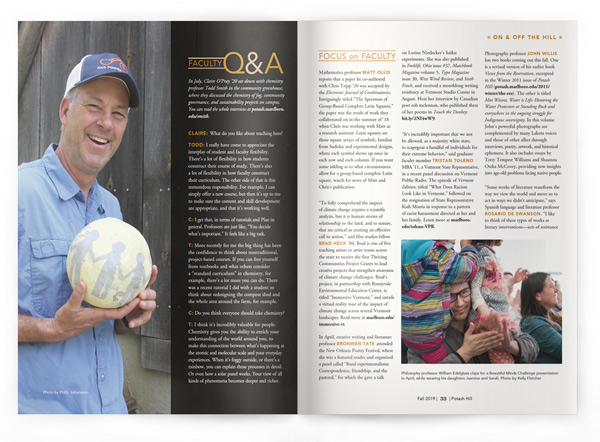
Faculty Q&A
In July, Claire O’Pray ’20 sat down with chemistry professor Todd Smith in the community greenhouse, where they discussed the chemistry of fog, community governance, and sustainability projects on campus. You can read the whole interview.
Claire: What do you like about teaching here?
Todd: I really have come to appreciate the interplay of student and faculty flexibility. There’s a lot of flexibility in how students construct their course of study. There’s also a lot of flexibility in how faculty construct their curriculum. The other side of that is this tremendous responsibility. For example, I can simply offer a new course, but then it’s up to me to make sure the content and skill development are appropriate, and that it’s working well.
C: I get that, in terms of tutorials and Plan in general. Professors are just like, “You decide what’s important.” It feels like a big task.
T: More recently for me the big thing has been the confidence to think about nontraditional, project-based courses. If you can free yourself from textbooks and what others consider a “standard curriculum” in chemistry, for example, there’s a lot more you can do. There was a recent tutorial I did with a student to think about redesigning the compost shed and the whole area around the farm, for example.
C: Do you think everyone should take chemistry?
T: I think it’s incredibly valuable for people. Chemistry gives you the ability to enrich your understanding of the world around you, to make this connection between what’s happening at the atomic and molecular scale and your everyday experiences. When it’s foggy outside, or there’s a rainbow, you can explain those processes in detail. Or even how a solar panel works. Your view of all kinds of phenomena becomes deeper and richer.
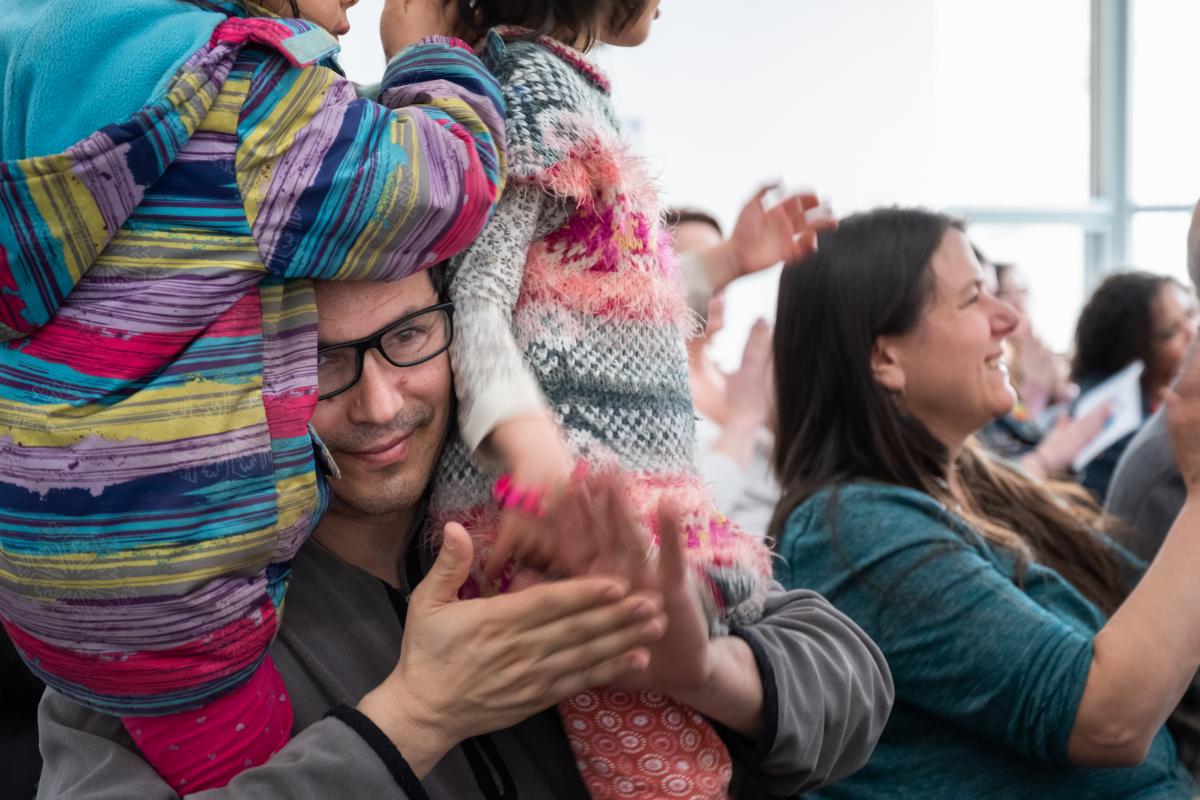
Mathematics professor Matt Ollis reports that a paper he co-authored with Chris Tripp ’20 was accepted by the Electronic Journal of Combinatorics. Intriguingly titled “The Spectrum of Group-Based Complete Latin Squares,” the paper was the result of work they collaborated on in the summer of ’18 when Chris was working with Matt as a research assistant. Latin squares are those square arrays of symbols, familiar from Sudoku and experimental designs, where each symbol shows up once in each row and each column. If you want some inkling as to what circumstances allow for a group-based complete Latin square, watch for news of Matt and Chris’s publication.
“To fully comprehend the impact of climate change requires a scientific analysis, but it is human stories of relationship to the land, and to nature, that are critical in creating an effective call to action,” said film studies fellow Brad Heck ’04. Brad is one of five teaching artists or artist teams across the state to receive the first Thriving Communities Project Grants to lead creative projects that strengthen awareness of climate change challenges. Brad’s project, in partnership with Bonnyvale Environmental Education Center, is titled “Immersive Vermont,” and entails a virtual reality tour of the impact of climate change across several Vermont landscapes. Read more.
In April, creative writing and literature professor Bronwen Tate attended the New Orleans Poetry Festival, where she was a featured reader and organized a panel called “Rural experimentalisms: Correspondence, friendship, and the pastoral,” for which she gave a talk on Lorine Niedecker’s haiku experiments. She was also published in Forklift, Ohio issue #37, Matchbook Magazine volume 5, Typo Magazine issue 30, West Wind Review, and Sixth Finch, and received a monthlong writing residency at Vermont Studio Center in August. Hear her interview by Canadian poet rob mclennan, who published three of her poems in Touch the Donkey.
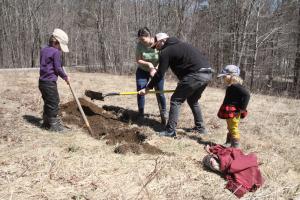
“It’s incredibly important that we not be allowed, as a majority white state, to scapegoat a handful of individuals for their extreme behavior,” said graduate faculty member Tristan Toleno MBA ’11, a Vermont State Representative, in a recent panel discussion on Vermont Public Radio. The episode of Vermont Edition, titled “What Does Racism Look Like in Vermont,” followed on the resignation of State Representative Kiah Morris in response to a pattern of racist harassment directed at her and her family. Learn more.
Photography professor John Willis has two books coming out this fall. One is a revised version of his earlier book Views from the Reservation, excerpted in the Winter 2011 issue of Potash Hill. The other is titled Mni Wiconi, Water is Life: Honoring the Water Protectors at Standing Rock and everywhere in the ongoing struggle for Indigenous sovereignty. In this volume John’s powerful photographs are complemented by many Lakota voices and those of other allies through interviews, poetry, artwork, and historical ephemera. It also includes essays by Terry Tempest Williams and Shaunna Oteka McCovey, providing new insights into age-old problems facing native people.
“Some works of literature transform the way we view the world and move us to act in ways we didn’t anticipate,” says Spanish language and literature professor Rosario de Swanson. “I like to think of these types of works as literary interventions—acts of resistance by means of representation—that can produce change.” Rosario wrote three blog posts on “Literature as Resistance” for Massachusetts Humanities, focusing on Mexican feminist Rosario Castellanos, Guinean writer María Nsué, and Afro-Peruvian writer Nicomedes Santa Cruz. Learn more. In July, Rosario led a discussion and presented a paper in a panel devoted to postcolonial research at the American Association of Teachers of Spanish and Portuguese conference in San Diego, California.
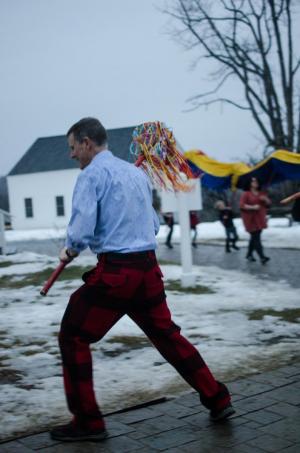
Anthropology professor Nelli Sargsyan co-edited a special issue of History and Anthropology (volume 30, issue 1), with her colleague Larisa Kurtović of University of Ottawa, titled “After Utopia: Leftist imaginaries and activist politics in the postsocialist world.” They also co-authored the introduction to the same issue, and Nelli published an individual article titled “Experience-sharing as feminist praxis: Imagining a future of collective care.” She will be making two presentations at the National Women’s Studies Association Annual Conference, taking place in San Francisco in November, on the theme “Protest, Justice, and Transnational Organizing.”
Philosophy and environmental studies professor William Edelglass published “‘That is why the Buddha laughs’: Apophasis, Buddhist practice, and the paradox of language” in Journal of Dharma Studies. This summer William gave a series of lectures to Chinese philosophers on environmental philosophy at East China Normal University, in Shanghai, as part of a joint program of the Royal Institute of Philosophy (UK) and the Chinese Academy of Social Sciences. He has been appointed the new director of studies at the Barre Center for Buddhist Studies, located in Barre, Massachusetts, where he has been teaching since 2015. See a recent commentary by William in Lion’s Roar on “How Buddhists can benefit from Western philosophy.”
In April, sculpture professor William Ransom presented an exhibit titled “Hold Everything” in both the Drury Gallery and the lobby of the Snyder Center for the Visual Arts. In all of his work, which spans sculpture, installation, video, and drawing, William creates sculptural situations where viewers can “grasp the tenuousness of time held in the static grip of an object, action, or image.” This exhibition, and an associated artist’s talk and reception, highlighted recent sculptural work in wood and everyday materials, arranged in ways that propose new spatial experiences in familiar spaces.
Theater professor Brenda Foley was a contributing playwright to the Boston production of The Audacity: Women Speak, a multivocal theater project produced in April by Sleeping Weazel at the Boston Center for the Arts. The production was awarded the 2019 Elliot Norton Award for outstanding production by a small theater, presented annually by the Boston Theater Critics Association. Brenda was also an invited speaker for a two-day Wheaton College symposium on Narrative Medicine and the Healing Arts, in collaboration with Charlotte Meehan, Strong Oak Lefebvre, Stephanie Burlington Daniels, Sarah Gambito, Maya Breuer, and Robbie McCauley.
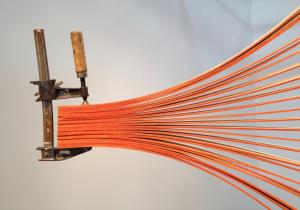
“The First Amendment is the Queen of Rights,” says politics professor Meg Mott. “Without freedom of speech and freedom of assembly, we don’t have a liberal democracy. But none of the freedoms in the Bill of Rights are absolute. Even speech needs to be regulated in order to protect the public peace. The question is, where do we draw the line?” Meg opened up the First Amendment for debate in June at Brattleboro’s Brooks Memorial Library, part of her ongoing Debating Our Rights series. She followed with a discussion of the Second and Third Amendments in July. Learn more.
In April, music professor Matan Rubinstein presented the inaugural event for Marlboro’s new “ensemble in residence,” called Marlboro Slipstream Group. Also known as MSG, the ensemble is composed of Matan (piano, electronics), Jake Charkey (cello), Andrew Greenwald (drums, percussion), and Ned Rothenberg (alto saxophone, clarinet, bass clarinet, and shakuhachi). “MSG was conceived as a musical meeting of four performers/composers/ improvisers of wildly different musical backgrounds, to make music that is betwixt and between,” says Matan. The program included the world premiere of Terraplane, a multimovement composition inspired by Jack Womack’s dystopian parallel-universe science fiction novel by the same title.
